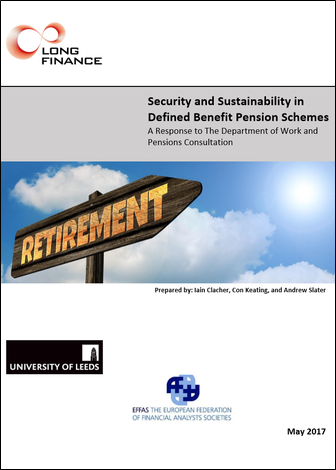Authors
Iain Clacher, Con Keating, and Andrew Slater
Sponsored by
- European Federation of Financial Analysts Societies
Published by
Long Finance (May 2017), 125 pages.
Share on social media:



Security & Sustainability In Defined Benefit Pension Schemes: A Response To The Department Of Work & Pensions Consultation
In the best tradition of speaking truth unto power, the authors respond forthrightly to the questions posed in this green paper consultation. From fundamental first principles, they analyse, review, and discuss the green paper’s narrative framework, which supports and gives rise to the Green Paper’s questions. They conclude that a major public policy debate over pension scheme member security has never taken place, and such a debate is essential. They also conclude that it is possible, and highly desirable, to reinvigorate the provision of occupational defined benefit pensions – to this end, they make eleven principle recommendations.
The analysis supporting the responses to the six multi-part questions of the Green Paper exposes the shortcomings, conflicts, and perverse incentives arising from the existing legislation and its institutions. The deficiencies in regulation and supervision motivate the authors’ call for the creation of a Royal Commission to investigate and report on the operations, accountability, and role of the Pensions Regulator. In contrast, reform of the Pension Protection Fund (PPF) needs only that it be required to pay the full benefits of members of schemes, along with being privatized, and opened to free market competition.
The Principal Recommendations are to:
- Debate and determine the precise role of defined benefit (DB) pension schemes, and their funds, and
- if it is deemed socially desirable for these to function as institutions capable of providing previously promised pensions after the demise of their sponsor, explicitly write this into UK Pensions Law;
- accompany this with prudential regulation for schemes which is similar to that applicable for insurance and assurance companies.
- Establish a Royal Commission to investigate and report on the operations, accountability and role of the Pensions Regulator.
- Remove the Pensions Regulator’s statutory duty of reducing the risk of pension schemes ending up in the Pension Protection Fund.
- Add a new statutory objective for the Pensions Regulator: to promote the provision of high quality occupational pensions.
- Require the Pension Protection Fund to pay the full pensions entitlements of scheme members.
- End the monopoly of the Pension Protection Fund.
- Require schemes to hold pension indemnity insurance/assurance.
- Privatise the Pension Protection Fund.
- Limit corporate liability for scheme funding to performance of the contract created by the pension award.
- Eliminate the Section 75 valuation and its applications, while introducing a statutorily over-riding negative pledge which requires the company not to offer security or priority in status to other debt obligations without offering equivalent to the scheme trustees.
- Eliminate the Section 179 valuation.
Numerous other minor recommendations are made in the responses to questions and in the body of the response. Among these are to:
- Encourage a diversity of liability valuation viewpoints.
- Introduce legislation enabling defined ambition and collective defined contribution scheme structures.




